Tour de France: Tadej Pogacar's coach hits back at doubters, says rivals have yet to push him
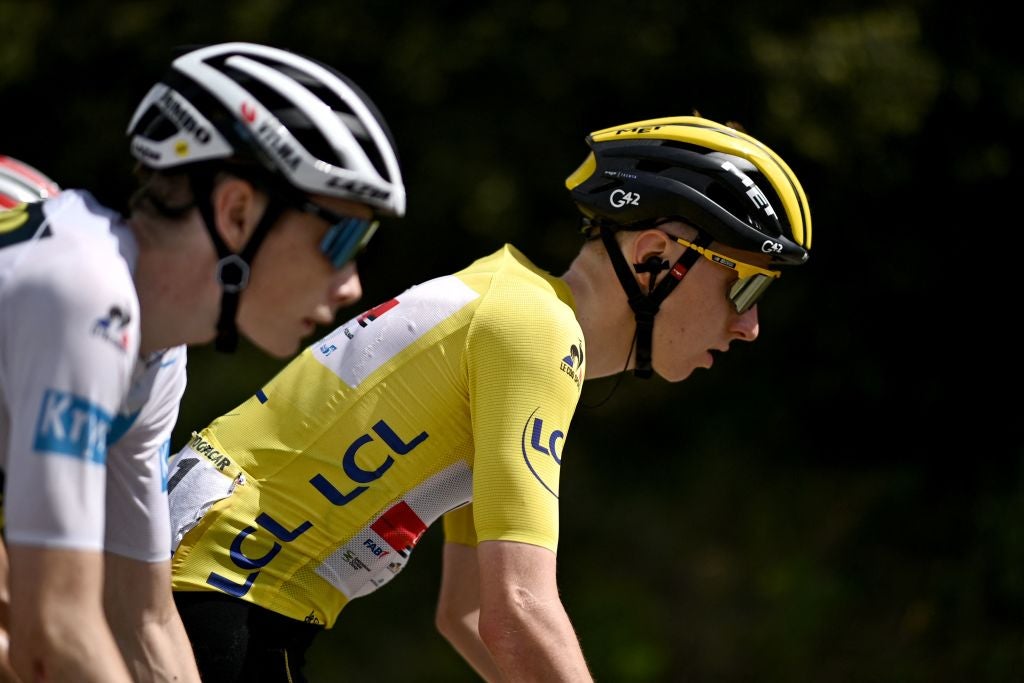
Team Jumbo Visma's Jonas Vingegaard of Denmark wearing the best young's white jersey (L) rides next to Team UAE Emirates' Tadej Pogacar of Slovenia wearing the overall leader's yellow jersey during the 12th stage of the 108th edition of the Tour de France cycling race, 159 km between Saint-Paul-Trois-Chateaux and Nimes, on July 08, 2021. (Photo by Anne-Christine POUJOULAT / AFP) (Photo by ANNE-CHRISTINE POUJOULAT/AFP via Getty Images)
Much of the talk at this year’s Tour de France has been about Tadej Pogačar’s dominance of the battle for the yellow jersey.
Pogačar, the defending champion, currently sits 5:18 ahead of second place Rigoberto Urán in the general classification, with Jonas Vingegaard (Jumbo-Visma) a further 14 seconds in arrears.
Two crushing attacks in the Alps saw Pogačar ride away from the other race contenders with apparent ease on stages 8 and 9, prompting Movistar’s Enric Mas to say that Pogačar rode as if the other riders “didn’t exist.”
“He didn’t go all-out, as he can do at times,” Mas said on the first rest day. “We were all thinking about the podium, and he just moved away as if we didn’t exist. We made a mistake of not trying to follow, we shouldn’t have let him get more time, but we were a bit scared that he would do what he did the day before.”
Given the history of cycling, the Slovenian’s dominance has led, almost inevitably, to raised eyebrows and comparisons on social media and elsewhere to past performances by riders subsequently involved in scandal. And during a press conference on Monday, Pogačar was asked whether he could alleviate concerns that his performances in this Tour seem too good to be true.
This has provoked frustration on the part of Team UAE Emirates’ head coach Iñigo San Millán, who also also acts as Pogačar’s personal coach. Surprisingly, San Millán insists that it is not that the defending champion has stepped up a level this year, but rather that his rivals have not performed as expected.
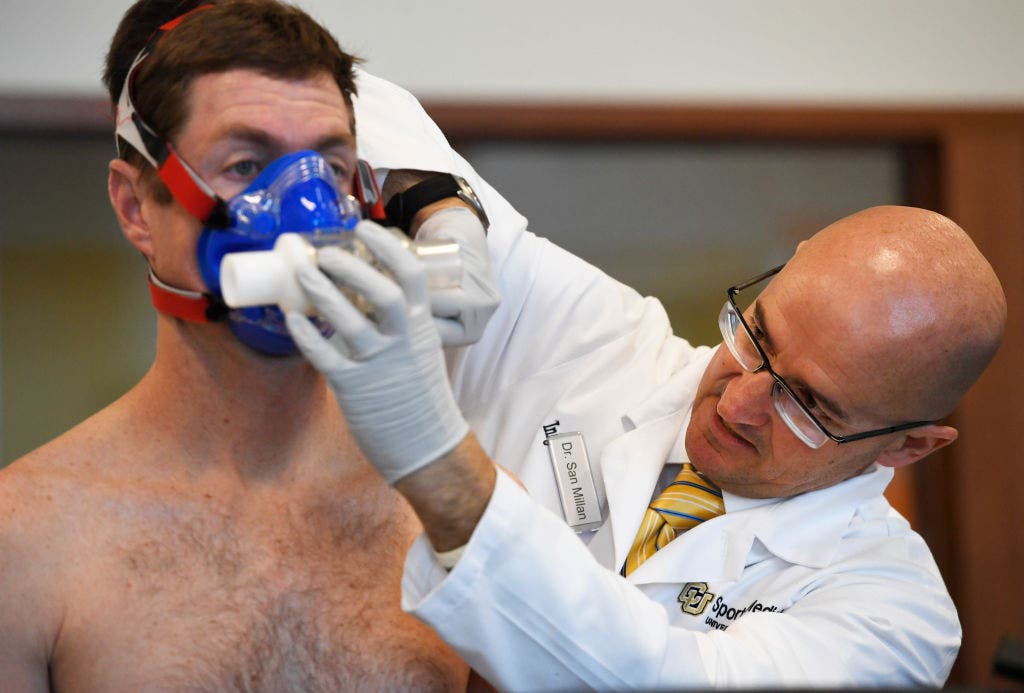
“It is frustrating people thinking that Tadej has been extra-galactical [extra-terrestrial] this year when he has never achieved the numbers he had last year,” Dr. San Millán said in a long conversation earlier this week. “He hasn’t achieved those numbers because he has never been challenged. So he’s going slower than last year; the reality is the rest have nothing. Absolutely nothing. They can’t even attack. Within one minute, you have six, seven riders who can’t even attack each other. It is very strange.”
That changed on stage 10 over Mont Ventoux when Jonas Vingegaard (Team Jumbo-Visma) succeeded where nobody else had this year, managing to distance Pogačar. He was hauled back on the descent, but it was the first time the Slovenian had been gapped. Whether or not that spells more interesting, open racing ahead remains to be seen, but substantial time gaps remain.
Dr. San Millán is a professor at the University of Colorado School of Medicine, specializing in research into cancer, diabetes, and cardiometabolic disease. He has also been involved in pro cycling on and off over the years, having roles with teams such as ONCE, Saunier-Duval and Astana. Despite those squad’s controversial pasts, San Millán has personally been regarded as an exponent of a clean cycling.
He worked with the Garmin team for several seasons, alongside riders such as Dan Martin. Then, after a break from the pro scene focusing on academia and research, he joined UAE Team Emirates at the end of 2018.
Pogačar signed with the team around the same time. Having worked with him in the years since, Dr. San Millán insists that his dominance is down to talent and training rather than something nefarious. And, as regards to the mountain stages in this Tour, to what he says is a curious slump in performances by the other main contenders.
“My humble opinion is that the pace of all the stage races, the majority of all of the one-week stage races this year, has been faster than the first week of the Tour de France,” Dr. San Millán said. “The Tour de France in fact has been one of the slowest first weeks, in comparison to the one-week stage races. And yet people are dead. That is the first thing. But the second thing is that people have made a lot of mistakes in their preparation at altitude training camps for the Tour. As they did already last year, like Ineos and Jumbo. Well, I would imagine that’s the case. Obviously Ineos messed up last year, like they did this year. And Jumbo didn’t work out last year, and it is not working this year either.”
“Unfortunately Roglič had that bad crash. It is too bad, because we would have expected him to be at the level of Tadej,” he added. “But he wasn’t. But the rest of the riders, they are a shadow of what they were during the rest of the season.”
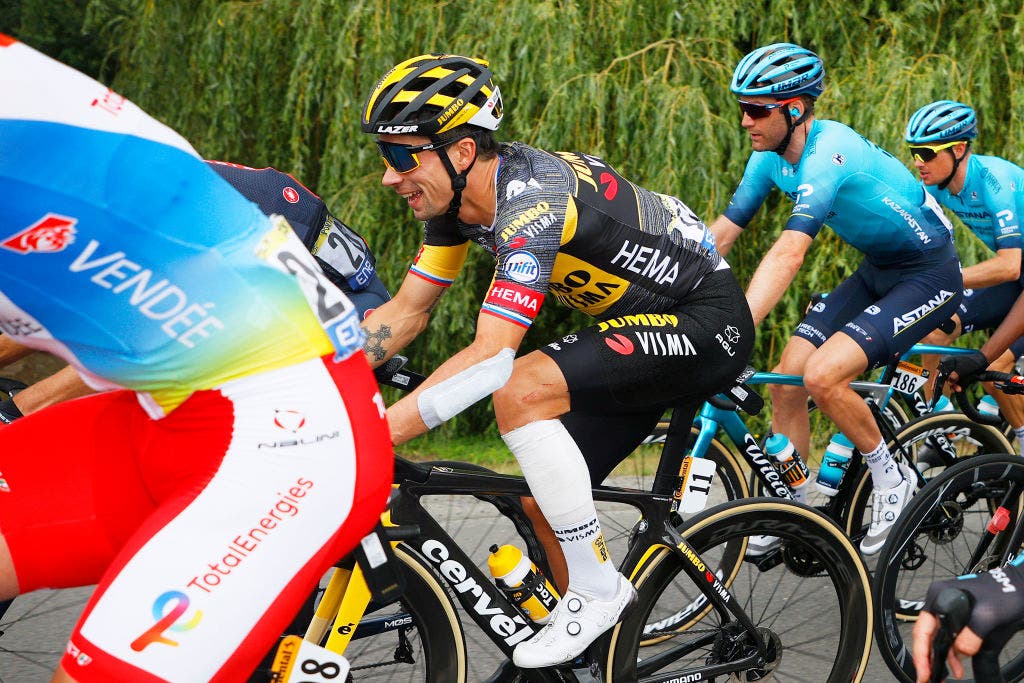
Dr. San Millán’s comments are unexpected and will likely be questioned by supporters of the teams concerned. They also come alongside quotes by riders such as Thomas de Gendt, who said he felt the general level in the peloton had jumped. “I rode one of my best 10-minute efforts ever at the start [of stage 8],” he told Sporza. “Those values have been recorded since 2013.
“Normally, with those values, I can ride the whole peloton to pieces. Here, I was 100 meters behind in a group of 70 riders – and I started from the front row. When you’re not in the peloton after that it’s clear that the general level is just much higher.”
Fellow Belgian Greg van Avermaet echoed this to Sporza after stage nine. “I rode my better [power] numbers and was in the last group”, van Avermaet said. “The others just rode faster.”
Both riders referenced the wave of younger riders coming through, and what they see as a step up in terms of the general performance level.
However Dr. San Millán said that the data files he has access to bear out his line of thinking.
“I have Tadej’s data and, again, he has not achieved the numbers he had last year because he has never, absolutely never, been challenged [in this Tour]. When you are not challenged and you put minutes into the rest, you are not going to go and die for it,” Dr. San Millán said. “You only die [go flat out] when you are challenged and then you give your best numbers. Now, you only go at your threshold or a little bit above it. That is it.”
“Also, I have the reference for the speed of other riders. For example, take the Col de Colombière the other day [on stage 8]. The immediate group behind Pogačar was Carapaz, Vingegaard, Mas, Urán, and we had there [Davide] Formolo,” he added. “So, looking at Formolo’s file, I know how well how fast they went. It is really, really low.”
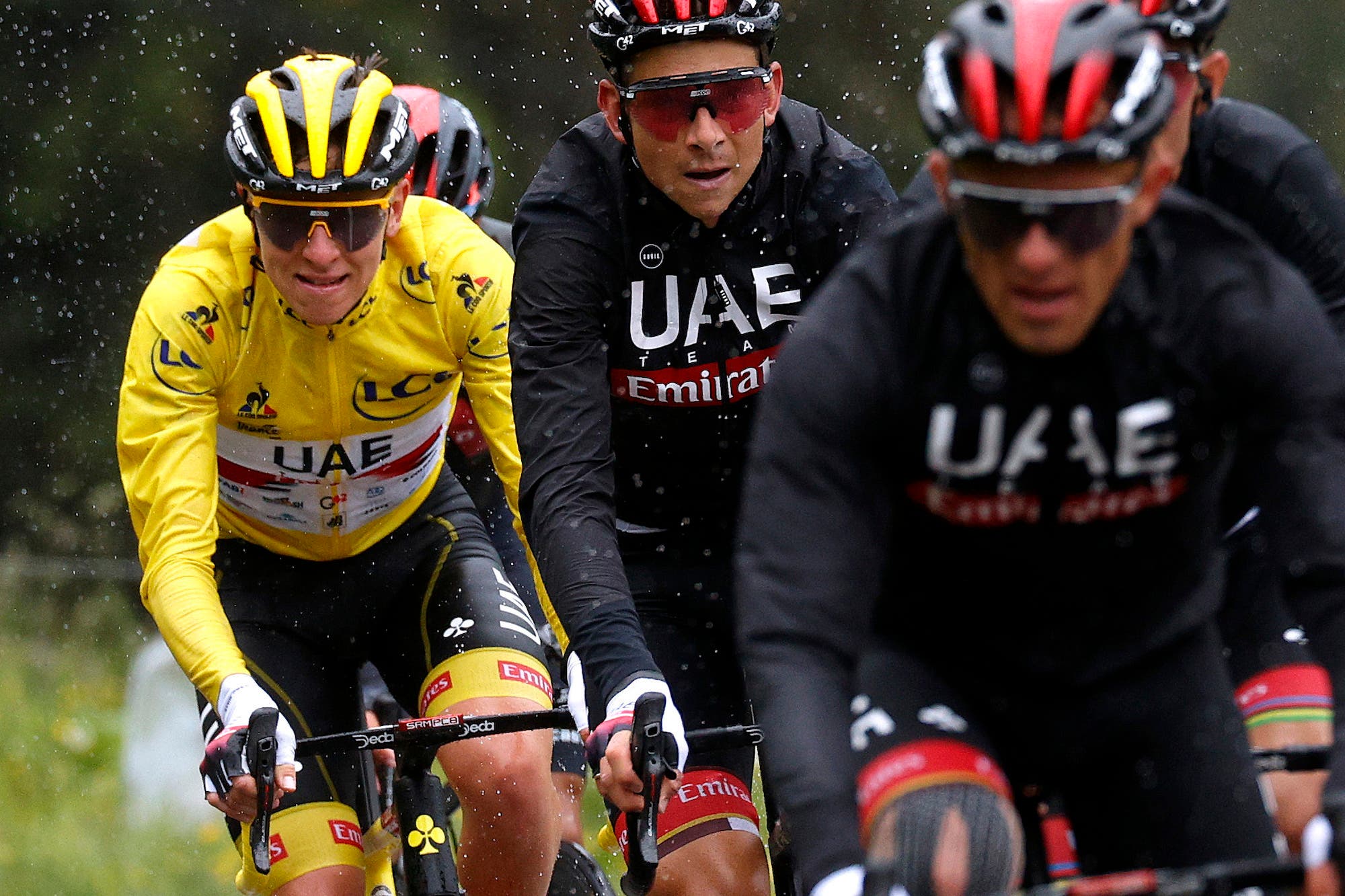
Dr. San Millán said that Formolo was not on a good day. “He was with them, even though he had diarrhea that day. He has been going through gastroenteritis the last three, four days. And because he is on this team, I have his data,” he said. “And by having his data, I know how fast they went because he was with them. And when I see Formolo at 5.79…I am sorry, he is my friend, but that’s very low. No wonder Tadej put two minutes [into the group] on the Colombiere. With 5.8 [watts per kilo], you don’t go anywhere.”
“These guys, they are normally way faster than this,” he added. “Way faster. I mean, they can’t go over 6 watts per kilogram [here]. And yet this is something that they do in any other race. Whether it is Tirreno, Basque Country, Paris-Nice, Catalunya, they go at 6.2, 6.3, 6.4. Even 6.5. And now in the Tour, they can’t even go up to 6 watts per kilo.”
“The stage to Tignes was ridiculous. When he [Pogačar] attacked, he attacked a little bit below his threshold, and he even decreased the pace significantly in the last one and a half kilometers. He was like, ‘f**k, man, what is going on here? These guys can’t even follow me.’
“He is not extra-galactical, because nobody is pushing him. He is not even putting out the numbers he did last year. And the rest, they are a shadow of what they have been.”
Dramatic decrease in performance
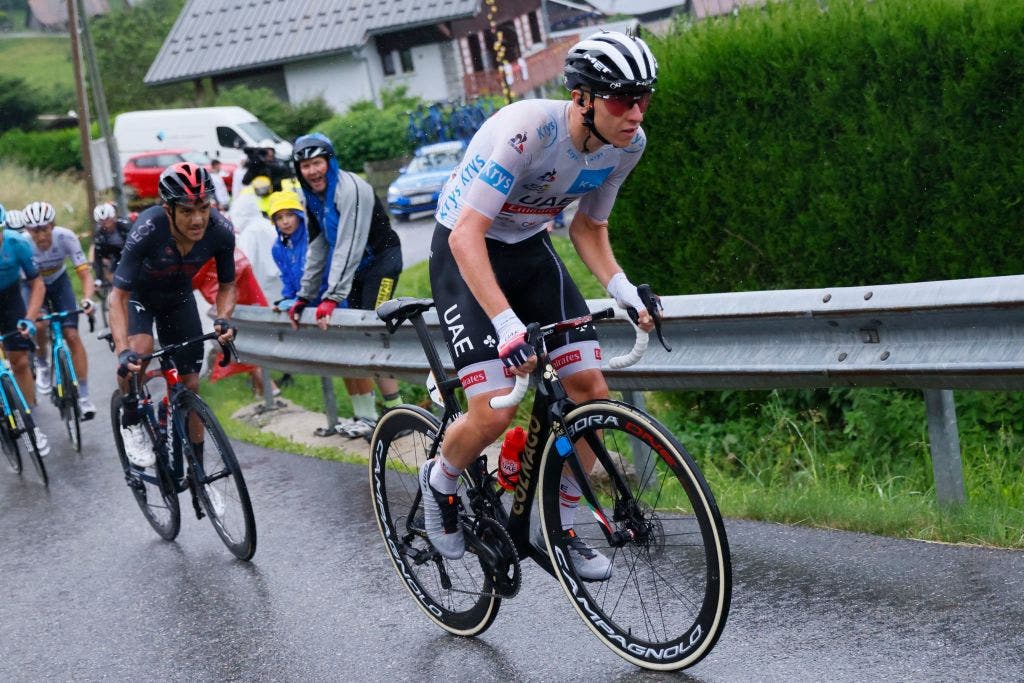
If Dr. San Millán’s assertion about a drop in level of the other contenders is valid, it is worth determining why he believes this would be the case. Stages 8 and 9 were held in cold, wet weather conditions. Could the conditions have blunted their usual climbing performances?
“It’s possible. Yes, sure. That is a good point,” he said. “We all know that Tadej loves bad weather and he always performs well in bad weather. We know that some riders lose a lot of power. Sure. But still, I don’t think that is the point. It could have contributed. Sure, it could’ve been exacerbated by the bad weather.”
“I just think there is a dramatic decrease in performance in many riders,” he added. “We already saw the time trial, that is where we asked, ‘wait, what is going on here?’ Tadej did a very good time trial, as expected. But wow, he put a whole world into the others. That is when we thought, ‘wait, something is wrong here.’ And sure, we saw that in the next days too.”
“Unfortunately all this is making Tadej looking like he comes from a different planet. But in fact he is riding with riders that … I insist, if they rode like this in Tirreno Adriatico, Paris-Nice, Basque Country, all these riders would have lost four minutes or three minutes or two minutes on the climbs. All of them. But this is the Tour and this is why it looks like he is from a different planet, because we all assume that these guys are going to be at their peak. But they are way below what they were in the other races this year. Way below.”
This is peculiar: the Tour is the most important event in cycling and riders and teams work specifically towards being in the best possible shape for the event. If Dr. San Millán is correct and there has indeed been a slump in the form of most GC contenders, and if the cold, wet weather doesn’t explain the difference, what else does?
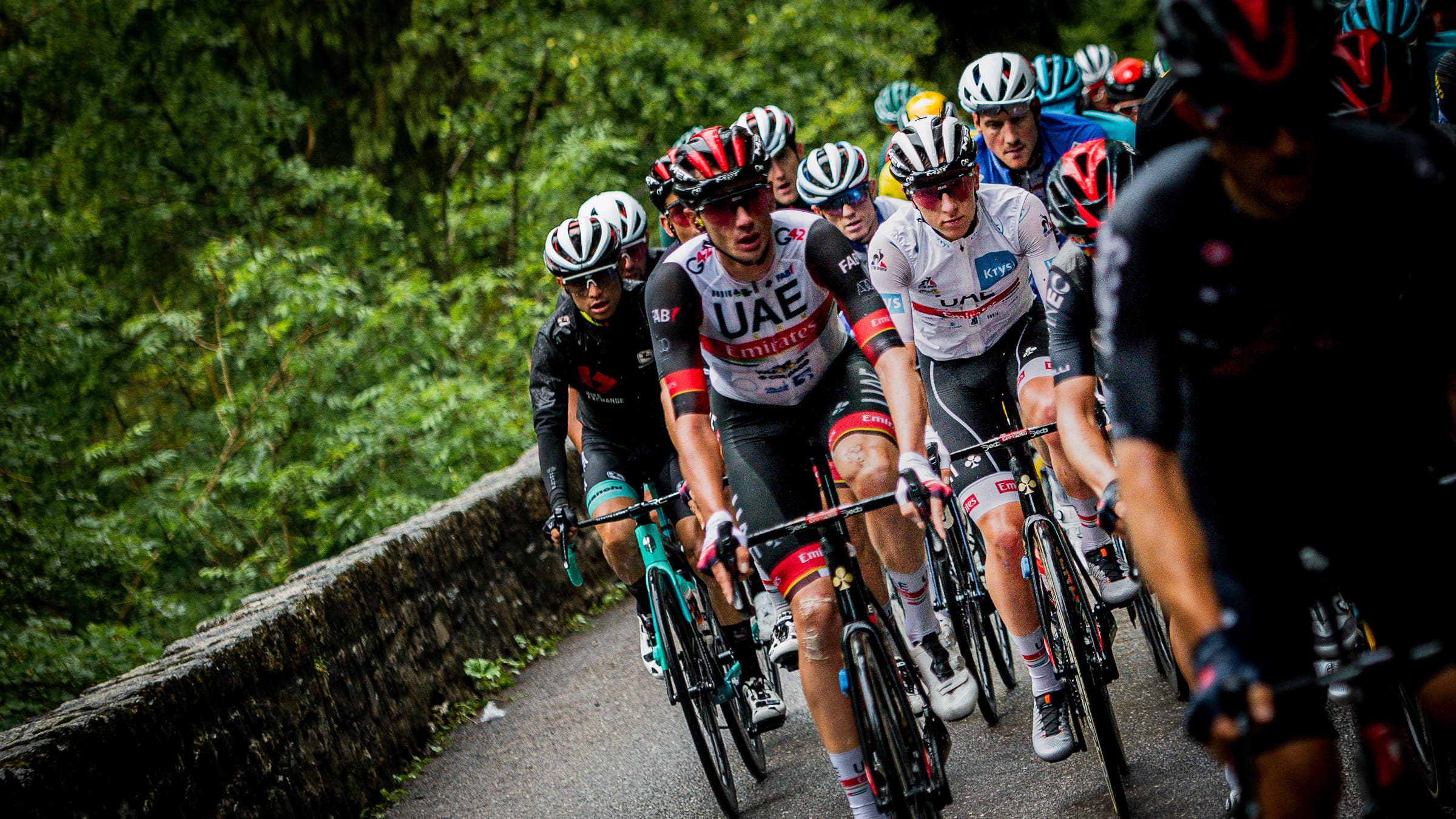
“I have no idea,” he said. “I focus on what we do, but I mean it is clear that something is wrong. It happened to other teams last year, and it is happening again to more teams. I don’t know.
“Again, it might be that maybe they started way too fast this year [in terms of early season form – ed.]. And then a combination of them not recovering properly [from that] and that maybe they didn’t do the right training camp at altitude,” he said. “Because that is the other thing, you really need to measure a lot of things. With us, we did analysis to see if the riders are catabolic [losing muscle], how their training is being stimulated, what their fatigue is, and we are being very, very careful with the nutrition. Nutrition at altitude is a whole different planet compared to at sea level.
“I don’t know if all the teams haven’t done this properly or what. That I cannot say, but what I know is that they messed up last year and they messed up this year as well. And we haven’t been doing anything special, to be honest. We did what we should. And then you see Tadej has been having the same level the whole year. He has had higher numbers training than what he is doing in these days.”
Still, given the problems which have affected the sport, what makes Dr. San Millán have confidence in the UAE Team Emirates riders? “Well, what I see from the team is normal numbers,” he said. “As you saw, we are not dominating anything. We have one rider who is the best in the world, but as a whole team, we are a good team but we are not dominating.
“We put the whole team to pull on stage nine, and we couldn’t even get one single second back on O’Connor. He was even putting time on us, yet we had the whole team riding.. If we had something [suspicious] going on, we would have put three minutes in half a kilometer on O’Connor, but he was putting time on us.”
‘The more data you give, the more room there is for speculation’
Some have called for the team to release Pogačar’s data files to alleviate concerns over his performance. Some riders have done that in the past but while Dr. San Millán said he is personally unopposed to this, he said that current team policy is not to release riders’ numbers.
“If you show data…even if the data is reasonable, you are going to see people saying ‘oh yeah, I am sure they tricked the power meter,” he said. ” The power meter is adjusted on purpose by the SRM production in Germany to be 10 percent lower so that they can show it to us.’ There is no doubt that people are going to say things like that.”
“And they will say, I assure you that this is not 6.3 (watts per kilo), it is 6.8 because it is impossible because of the VRAM and this and that. At the end of the day, the more data you give, the more room there is for speculation,” he added.
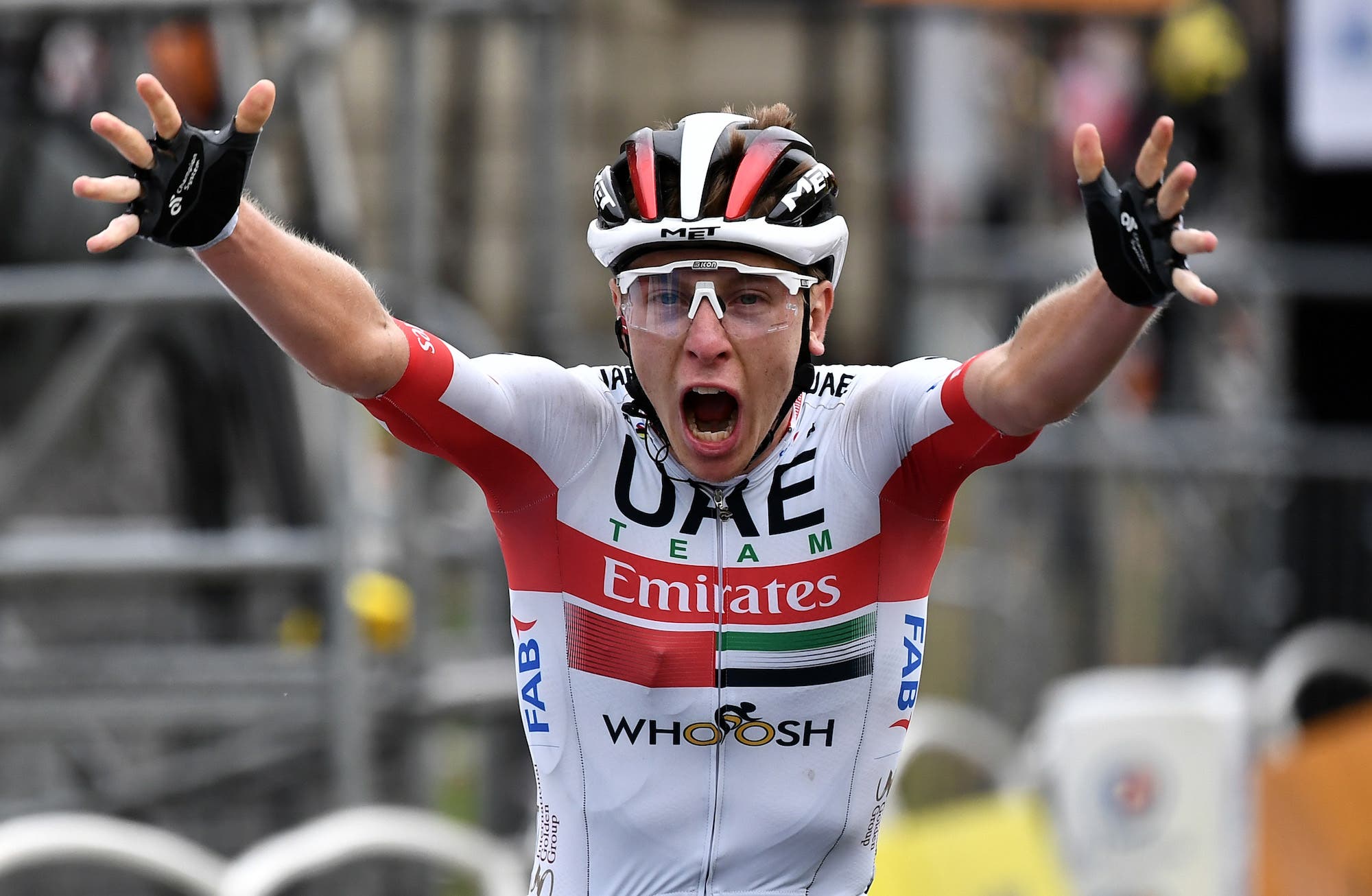
“Unfortunately the sport has lived all these bad days. It is a pity because this new generation are very confused. Seriously. They say, ‘why the f**k do people keep asking these questions?’ Many of them were not even born, or they were four or five years old. Now there is an anti-doping environment and these kids are confused [by those questioning them]. They say, ‘why do we have to defend ourselves?’ They don’t understand,” he said.
“We are older and we know what has happened in cycling, but these kids have no clue. Seriously, they are saying ‘what the f**k, what have I done wrong?’ They’re confused by all of this.”
Dr. San Millán will be aware that staking his reputation on anyone in professional sport comes with risks. There are countless examples from the past of competitors within cycling—and, indeed, across a range of sports—who insisted upon their innocence, but were later exposed.
Still, he is adamant that he hasn’t seen any indication of improper behavior by Pogačar or others. If he does, he insists he would not stick around.
“Professionally, my main area in life is university, researching cancer and diabetes. Cycling is secondary to that. So obviously I am not going to…it is not important. If Tadej wins the Tour, great. If he doesn’t win the Tour, I couldn’t care less, to be honest. This is the thing,” he said. “The important thing is the university. I love cycling. I feel that that there is a great opportunity these days in cycling because we all see that we have this generation of riders, they have the new mentality, there is an anti-doping mentality in the peloton and it is great to work [with that].”
“I passionately enjoy cycling, I am passionate about the sport,” he said. “But if I saw even minimum signs of anything weird, for sure I would walk away right away. This role is a very secondary thing in life for me. I am not going to erase my career as a researcher for the sake of a rider. That’s for sure.”